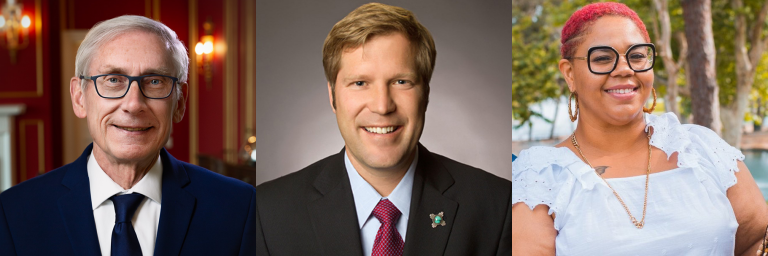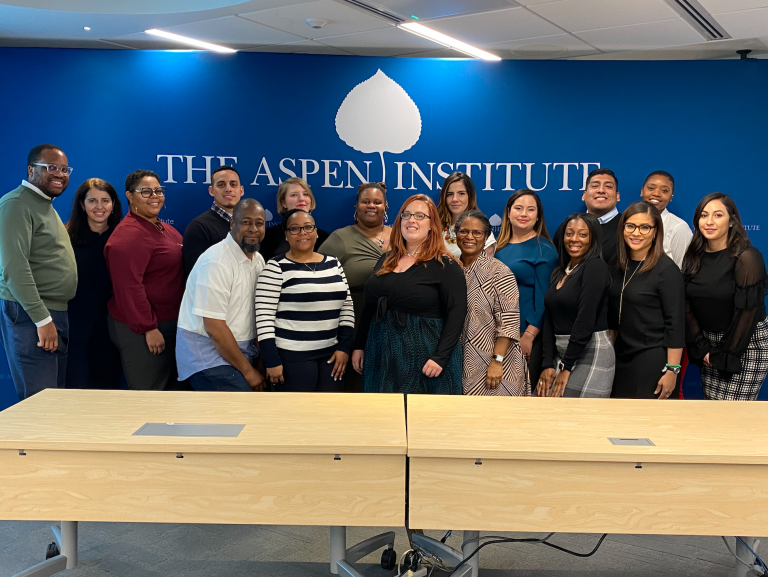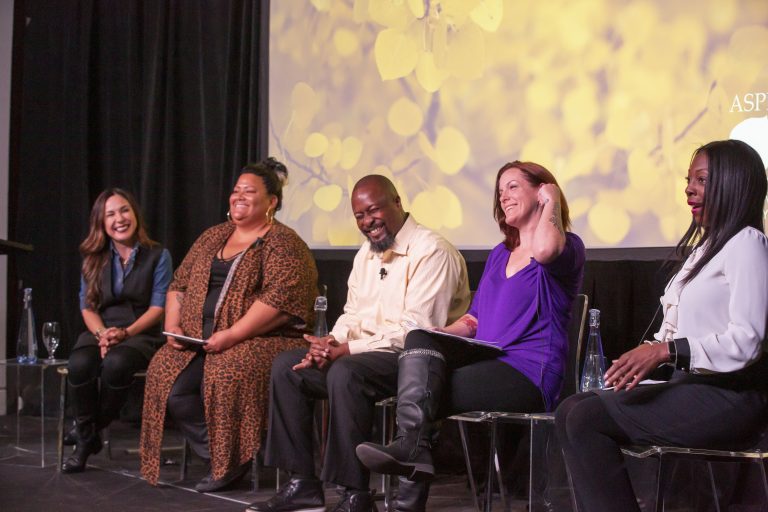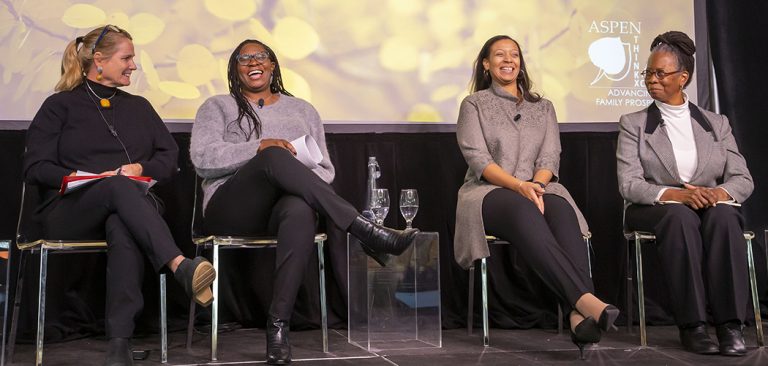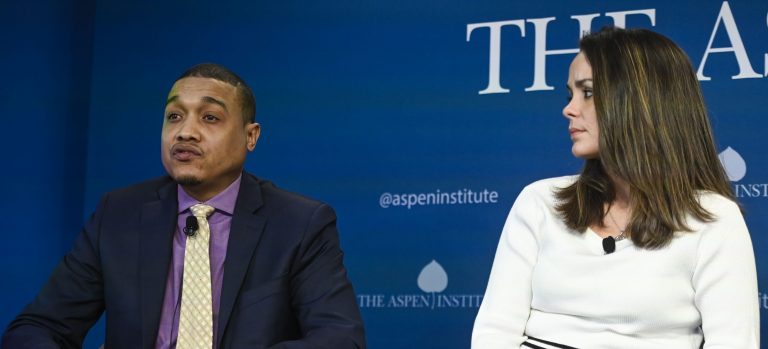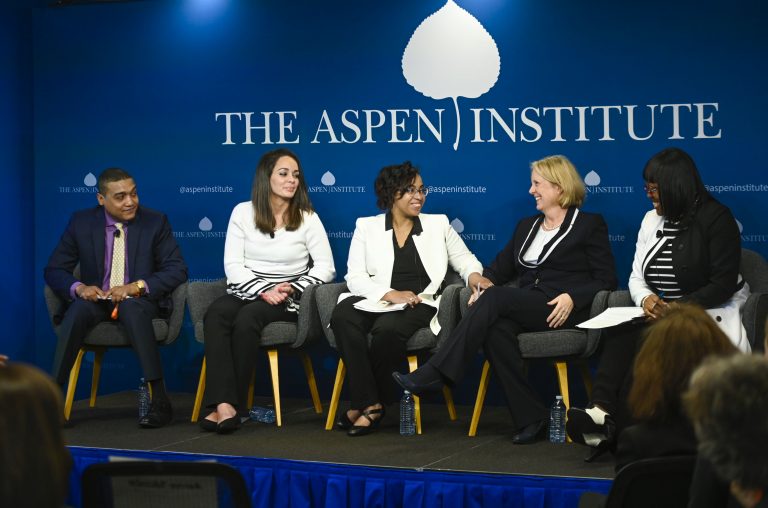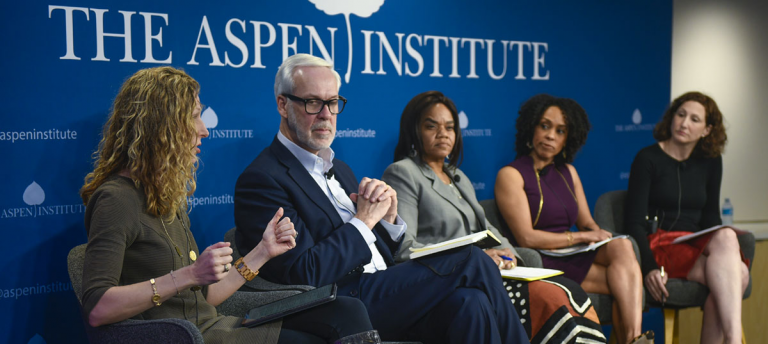Transforming Child and Family Mental Health in Washington, DC
Physical and mental health and well-being are core components of the two-generation approach that builds family well-being by intentionally and simultaneously working with children and the adults in their lives to move whole families toward educational success, economic security, and health and well-being.
Childhood trauma, for instance, has lasting health and social consequences. Similarly, economic supports, such as housing, and social capital, such as connections to one’s neighborhood and community, are important social determinants of health. The dynamics of local, state, and federal ecosystems are critical factors in identifying barriers and opportunities for increasing the health and well-being of children and families.
With the generous support of the Alexander and Margaret Stewart Trust; Children’s National Hospital, MedStar Georgetown University Hospital and Georgetown University Medical Center, and Ascend at the Aspen Institute co-hosted a four-part dialogue to inspire visionary change in mental health promotion, prevention, and treatment for children and families in the Nation’s Capital.
Over 10 months, the series engaged national leaders and region-wide stakeholders to build political will, knowledge, and relationships to rethink mental health systems in the region – highlighting the latest research and best policy and practices in the field of whole family-focused mental health.
Below are snapshots of takeaways from each conversation in the series.
1. Reimagining Mental Health Promotion, Prevention, and Treatment: New Models, Lessons Learned, and Opportunities for Innovation
Watch the first conversation of this four-part dialogue here.
Find the slide deck with presentations from speakers here and a brief session summary and themes here.
Presenters
- Barbara Martin, Director, Colorado State Innovation Model Office, Office of Governor Jared Polis
- Sydney Harris, Director of Mental Health Care Redesign, Dell Medical School, The University of Texas at Austin
- Katherine Jones, Director of Strategy & Mission, Design Institute for Health, Dell Medical School + College of Fine Arts, The University of Texas at Austin
- Chioma M. Oruh, Parent Support Specialist, Advocates for Justice and Education, Inc.
- Mark Lavota, Executive Director, DC Behavioral Health Association
- Joan Yengo, Chief Program Officer, Mary’s Center
Takeaways
- Focus on brain health: identify, convene, and organize key entities from all sectors that comprise your brain health system under a vision and an initiative structure
- Understand the system from the people experiencing it—family and community involvement is essential – “People First”
- Think in terms of a system of care instead of health care
- Continue conversation with a sense of urgency and understand the process requires patience
- Break down silos
- Map the system
- Bring services to communities
Resources
- Behavioral Health in the District of Columbia for Children, Youth, and their Families: Understanding the Current System
- Principles and Values to Guide Child and Adolescent Public Behavioral Health Care System Transformation in the District of Columbia
- 2019 Colorado Legislative Review
- Austin State Hospital Brain Health System Redesign
2. Advancing School-Based Mental Health: Policy, Practice, and Programs
As a continuation of conversations in the first two parts of this series – Olga Price, PhD., associate professor in the Department of Prevention and Community Health and director of the Center for Health and Health Care at George Washington University joined us for a conference call to follow up on her work designing a system dynamics approach to comprehensive school behavioral health in Washington, DC.
Local and national experts in school-based mental health addressed how school-based mental health programs can provide critical support to children and families living in communities impacted by high rates of violence. Topics included trauma-informed care, resilience, and building programs from a strength-based perspective.
Presenters
- Sharon Hoover, PhD., Associate Professor at the University of Maryland School of Medicine, Division of Child and Adolescent Psychiatry
- Olga Price, PhD., Associate Professor in the Department of Prevention and Community Health and Director of the Center for Health and Health Care at George Washington University
- Lashonia Thompson-El, Co-Chief Violence Interrupter, Office of the Attorney General
Takeaways
- How can organizations and communities engage with schools to respond to increasing rates of violence and build a plan that strengthens partnerships
- Important to take trauma-informed approach
- Families, communities, and students should be engaged in a multi-disciplinary process focused on strength-based work
3. The Building Blocks of Sound Mental Health: Re-Imagining Systems of Care in Early Childhood
Leaders and experts driving meaningful cross-sector collaborations and systems change in early childhood behavioral health explored how in this early period of opportunity, we can learn from, build on, and support families’ inherent resilience for sound mental health development.
Watch the third convening of this four-part dialogue here.
Linked here are the presentations from our outstanding speakers. Find South Carolina First Steps executive director Georgia Mjartan’s presentation here. Find a brief session summary and themes here.
Presenters
- A parent panel featuring Rachel Horton, Gladys Mathis, and Elicia Wright, moderated by Meghan Sullivan, project director at DC SEED, and Imani (Myra) Walker, family engagement coordinator at DC SEED;
- Kristin Bernhard, senior vice president, advocacy and policy at the Ounce of Prevention Fund;
- Dr. Jennifer Lee, adjunct associate professor of emergency medicine and health policy and management at George Washington University;
- Georgia Mjartan, executive director of South Carolina First Steps;
- Lorelei Vargas, executive director of Trinity Commons;
- Dr. Jimmy Venza, executive director of the Lourie Center for Children’s Social & Emotional Wellness; and
- Dr. David Willis, senior fellow at the Center for the Study of Social Policy.
Takeways
- Early childhood is where brain health begins
- 2-gen approach and cross sector collaboration is important
- Braided funding is essential for high quality programming
- There are programmatic, policy, and funding opportunities in the increased understanding of the importance of mental, emotional and behavioral health, particularly in early childhood
- There is a gap between an understanding of the importance of early care and learning and integrated systems that address the social and emotional needs of infants and young children
- Family and community voice should authentically inform all stages of program and policy development, implementation, and evaluation
- Partnerships are essential – as are champions
- Education and training for teachers, administrators, and families are critical
Resources
4. Stopping Behavioral Health and Substance Use Disorders Where They Start: Prevention and Treatment in Adolescence
Like all areas of behavioral health, prevention and early intervention for adolescent behavioral health and/or substance use disorders is critical. And, we know that times of crisis increase the prevalence of behavioral health disorders and substance use, making this conversation all the more urgent.
In this conversation local and national leaders shared how they are innovating to prevent, intervene, and be on the leading edge of behavioral health and substance use disorder prevention and treatment among adolescents and young adults.
Watch the fourth convening of this four-part dialogue – Stopping Behavioral Health and Substance Use Disorders Where They Start: Prevention and Treatment in Adolescents here.
Linked here are the presentations from our outstanding speakers.
Presenters
- Shana Simkin, Clinician and Faculty at MedStar Georgetown University Hospital;
- Dr. Aditi Vijay, Clinical Psychologist and Clinical Assistant Professor at MedStar Georgetown University Hospital;
- Dr. Melissa Long, Attending Pediatrician at Children’s National Hospital;
- Dr. John Straus, Founding Medical Director at the Massachusetts Child Psychiatry Access Program;
- Dr. Sharon Levy, Director of Adolescent Substance Use and Addiction Program at Boston Children’s Hospital and Associate Professor in Pediatrics at Harvard Medical School;
- Dr. James Ballard III, clinical director at the DC Department of Human Services Family Services Administration; and
- Hilary Cairns, deputy administrator at the DC Department of Human Services Youth Services Division.
Takeaways
- Age group of emerging adults faces rapid brain growth and new psychological and social challenges
- Social ramifications of COVID have profoundly affected this age group and there are serious concerns about the future
- More research is needed to better understand the strengths and vulnerabilities among this age group, especially among minority communities
- A developmentally specific approach is necessary—programs and interventions must be crafted in a way that is specific to the challenges of this age group
- It is important to work across professions and specialties in order to produce the best work
- Engagement, flexibility, and persistence is essential to successfully reach young people
- It is vital to have an awareness of mental health in all places where young people are engaged—reducing stigma is critical if all of these systems are interfacing with young people
- Need to maintain a contextual understanding of how young people are living, i.e., events in Minneapolis and elsewhere, and their impact
- The most important tool we have is a culture in which youth voices are valued
Resources
Each conversation in this series was led and moderated by Lee Beers, MD, medical director, Municipal and Regional Affairs, Child Health Advocacy Institute at Children’s National Hospital and Matthew Biel, MD, MSc, division chief of Child and Adolescent Psychiatry and associate professor of Clinical Psychiatry and Pediatrics, Georgetown University School of Medicine.
Lee and Matt co-direct the Early Childhood Innovation Network – a local collaborative of health and education providers, community-based organizations, researchers, and advocates promoting resilience in families and children from pregnancy through age 5 in Washington, DC.
Related Posts




